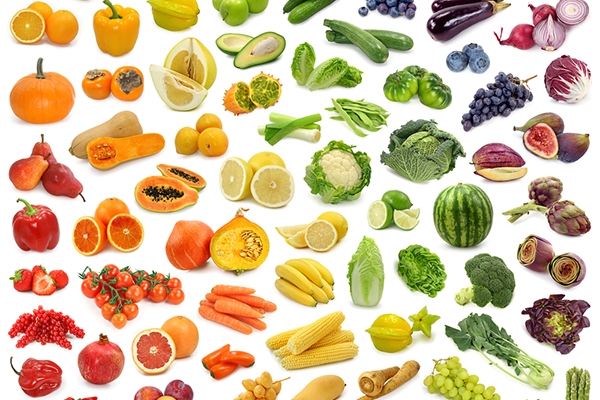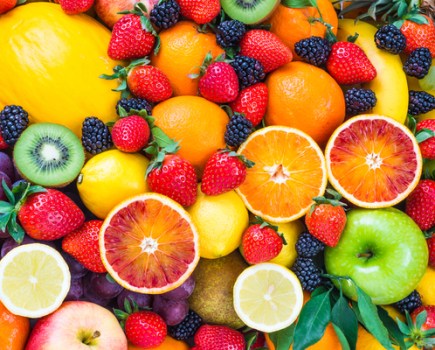It’s hard to beat a refreshing salad for lunch, or a crisp apple as a snack when the sun is shining and the temperatures are rising. After all, who wants to be slaving away in the kitchen when you can just grab and go with some gorgeous raw food?
Now a new study says this style of eating might benefit us all year round. And it’s not just our heart and our waistlines that will benefit, but our mental health too. So maybe it’s not just the weather, but also all the gorgeous fresh salads we eat that makes us love summer!
Eating raw foods is good for your mood
Whatever way we consume them, eating a wide variety of fruit and vegetables is central to a healthy diet. They help us stay well hydrated, they are packed full of fibre, and they are the richest natural sources of many of the nutrients our bodies need. And now scientists are discovering how beneficial they are for our brains too.
‘Until recently we knew that increasing our daily fruit and vegetable intake had beneficial effects on both protecting against mental illness such as depression, and promoting positive states of psychological wellbeing,’ says Kate Brookie, the PhD candidate who carried out the study at the University of Otago in New Zealand.
‘However, we didn’t know about the nuances of this relationship. One of our previous studies had shown that people with the most improved mental health also reported eating much of their produce raw. So, we decided that studying the effects of raw versus modified fruits and vegetables would be worthwhile, and we found that eating raw fruits and vegetables predicted improvement in mental health across the board.’
What’s so good about eating raw food?
The scientists believe that that there are more nutrients available in fruit and vegetables when they are in their raw state than when they are cooked. ‘It is thought that the micronutrients abundant in these foods play a role in the bodily systems involved in mood,’ says Kate.
‘For example, vitamin C – which we get primarily from fruits and leafy greens – is used in the production of dopamine, and increased dopamine has been associated with increased positive emotion, more energy, motivation and exploration behaviour. Unfortunately, the cooking and processing of fruits and vegetables has the potential to diminish some of these important nutrients.’
For example, broccoli has almost twice as much vitamin C when it is raw as when it is cooked. ‘When you cook fruit and vegetables, particularly if you boil them, some of the water soluble vitamins, which include vitamin C and some B vitamins, such as folic acid, are leached out of the vegetable and into the water,’ explains Healthspan nutritionist Fiona Hunter.
‘Our grandparents’ generation used to use this water for making the gravy, but today we usually throw it away, so we lose those vitamins. If you do want to cook your vegetables, we say the healthiest way is to steam, stir fry or microwave them, as this way they are not losing vitamins into the water.’
Raw food helps your gut health
The researchers state that the improvements in mood gained through eating raw fruit and vegetables could also be down to elements such as their high fibre and water content, which improves gut health and influences the overall wellbeing of the microbiome – the good bacteria in your gut.
‘There is increasing evidence for bi-directional communication between the gut and the brain, and that the diversity and health of the gut can influence brain functioning, including emotional wellbeing,’ says Kate.
- Try these prebiotic foods to keep your gut happy
Do I need five-a-day?
We are all used to public health campaigns such as five a day, which focus purely on how much fruit and vegetables we eat, but perhaps this will change in the future if this research is backed up by further studies. ‘If you’re specifically looking for mental health improvement, it may be important to include at least some of your daily servings in their raw form,’ says Kate. ‘I think, we are all looking for ways to boost our psychological wellbeing and protect against the often harsh realities of everyday life. I think small lifestyle changes such as diet and exercise can make us more resilient and provide a buffer.’
Health benefits of canned and processed fruit and vegetables
But before you chuck out all your saucepans and swear to only eat raw food, hold on a minute. ‘Cooked, canned and processed fruits and vegetables still contribute to a healthy diet – so we are not advocating for people to eliminate them,’ says Kate. ‘It’s still important to get enough daily servings of a good variety of fruits and vegetables, and I would suggest ensuring that some of these are eaten in their raw or unmodified form.’ If you do enjoy your fruit and vegetables lightly cooked, it’s fair to say that you’re better eating it that way than not at all.
‘And there are antioxidants in some vegetables that are actually easier for your body to absorb when the vegetables are cooked,‘ says Fiona, ‘for example, carrots contain loads of beta-carotene, an antioxidant that’s really good for your skin, but their cell walls are really tough, and it’s much easier for your body to access it when these walls are broken down by cooking. Canned or cooked tomatoes are also much higher in lycopene, a powerful antioxidant that helps prevent cancer and protects your heart, for the same reason.’
Add oil to vegetables for extra health gains
Another way to boost the amount of nutrients you can access is by adding oil. ‘Vitamins A, D, E and K are oil-soluble, which means that if you add some oil-based dressing to your salad, or stir fry your vegetables in a little oil, your body is able to access them much more easily,’ says Fiona. Ultimately, whatever form they take, the message is to increase your intake of fruits and veg.
‘Improving your diet and including more servings of raw fruits and vegetables is a simple thing that people can do on their own,’ says Kate. ‘I think with nutrition and mental health in states of global crisis, we need to continue finding new ways to tackle these problems, especially when the current approaches are not necessarily working for everyone. I don’t think diet is the be all and end all to mental health, but dietary approaches are likely to help maintain mental wellbeing in the long term.’
Maximise your nutrients
Kate’s tips to get the most out of your fruit and vegetables.
- If you do have to cook vegetables try lightly steaming them.
- If you are boiling, try using less water, reduce the cooking time, and leave your vegetables in large pieces to reduce the surface area.
- Try to eat your fruit and vegetables while they’re fresh.
- Storing your fruits and vegetables appropriately can preserve the nutrients. Potatoes and canned foods should be kept in cool dark places, whereas leafy greens should be refrigerated.
Which fruit and vegetables have the most vitamins?
- Grapefruits are almost as rich in vitamin C as oranges, and red grapefruit is also full of protective lycopene.
- Kiwifruit are a great vitamin C powerhouse, containing more gram for gram than an orange. It’s also rich in vitamins A, E and B, plus copper and potassium.
- Apples contain the antioxidant vitamin A, which fights inflammation. They also boast lots of B-complex vitamins, which will support your metabolism.
- Citrus fruits such as oranges are packed to the brim with vitamin C, which boosts mood, plus significant levels of B vitamins, which reduce your stress levels.
- Romaine lettuce contains vitamin C and beta-carotene which can prevent cholesterol build-up, plus potassium, which reduces blood pressure levels and heart disease risk.
- Cucumbers are rich in lignans, a type of phytonutrient which studies are discovering can reduce the risks of breast, uterus and ovarian cancers.
- Fresh berries have an unequalled level of antioxidant and anti-inflammatory phytonutrients, which protect against cancer and cell ageing.
- Spinach is a nutritional wonder, full of vitamins A, B, C, E and K, calcium, iron, magnesium, phosphorus, potassium, copper, and manganese, which are known to keep the brain healthy.
- Bananas are full of antioxidants such as lutein, zeaxanthin, beta and alpha carotenes, which protect the body. They also have lots of infection-fighting vitamin C.
- Carrots are rich in the antioxidant beta-carotene, which is converted into vitamin A in the liver, and is crucial for eyesight, skin and heart health.
Now discover… the amazing health benefits of mint







